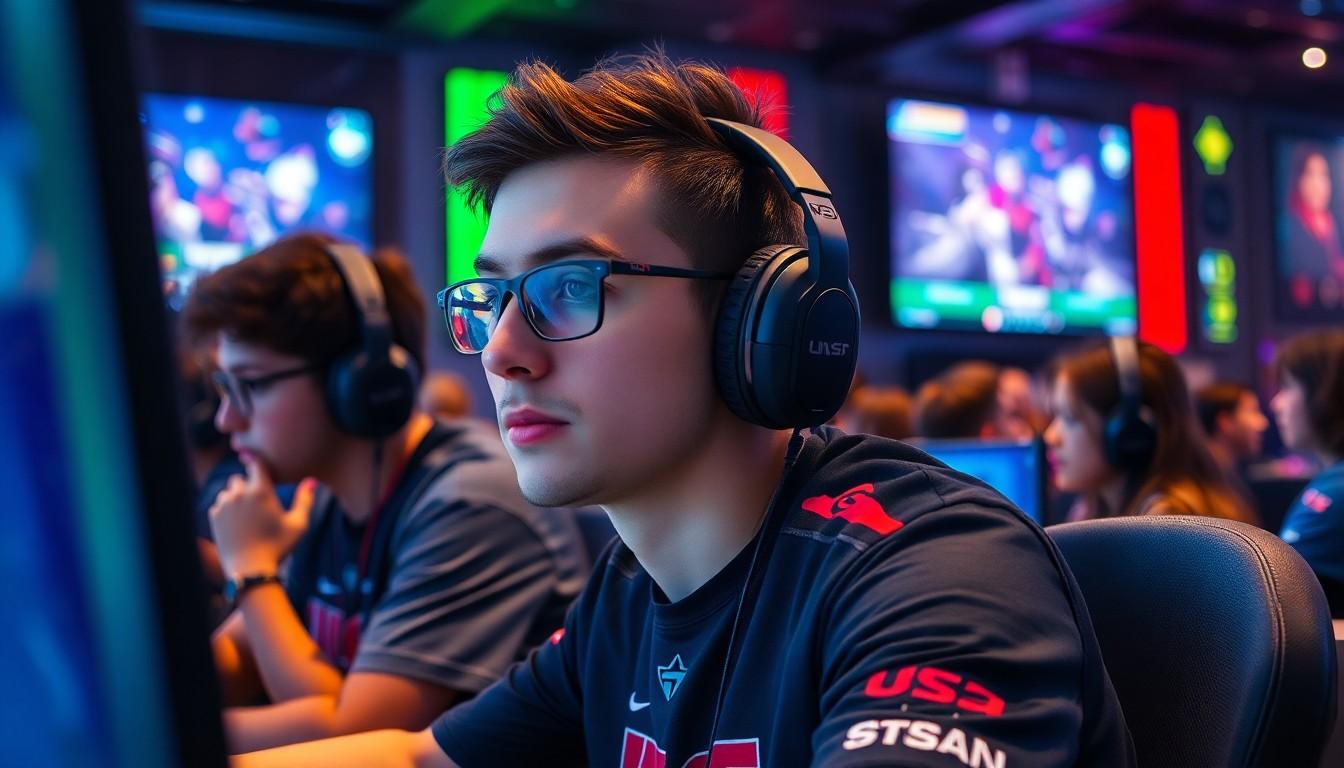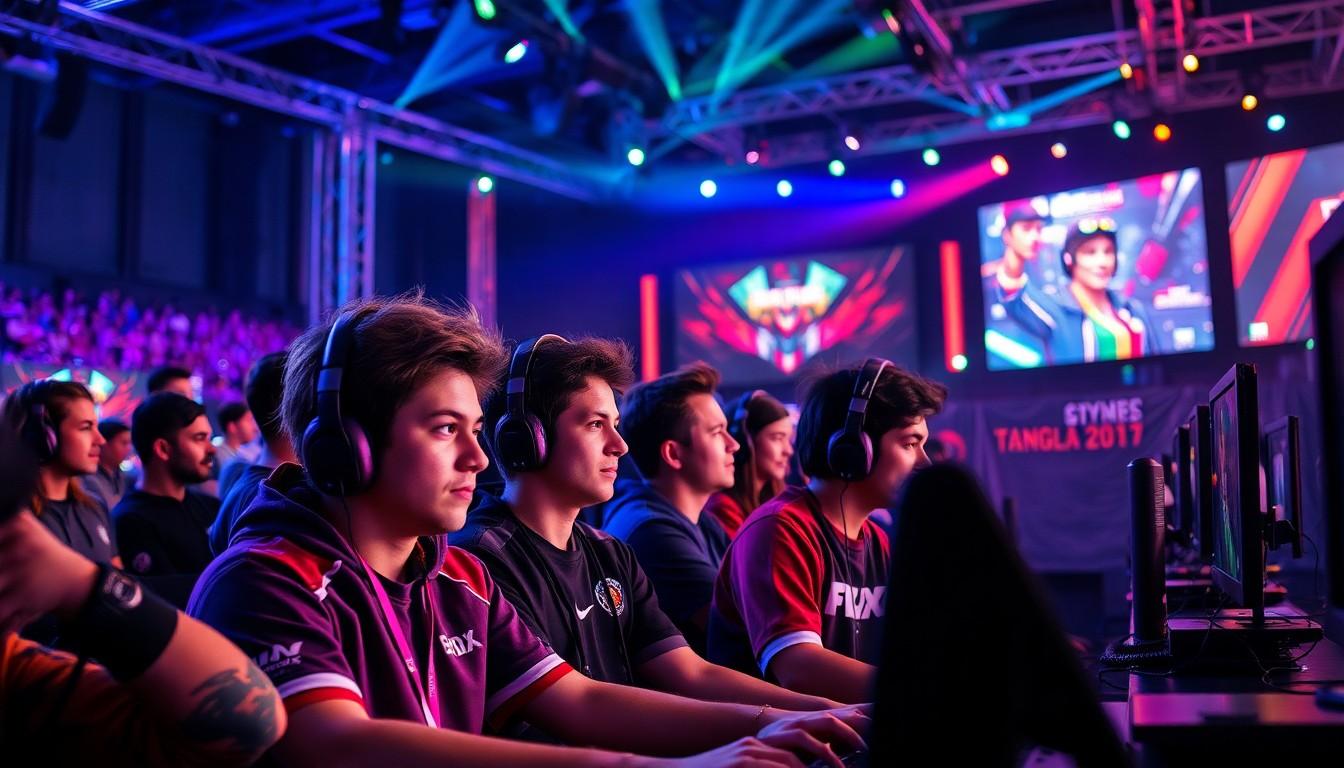
Is Esports in the Olympics? Explore the Future of Competitive Gaming
Imagine a world where athletes trade in their running shoes for gaming chairs and the thrill of competition unfolds on virtual battlefields instead of tracks. With the rise of esports, this scenario isn’t just a fantasy—it’s a real possibility. As traditional sports fans debate the merits of adding competitive gaming to the Olympic roster, questions arise: Can a game of League of Legends really be as exhilarating as a 100-meter dash?
Is Esports in the Olympics
Esports refers to competitive video gaming, where individuals or teams compete in organized tournaments for various games. Titles like League of Legends, Dota 2, and Counter-Strike: Global Offensive dominate the scene, drawing millions of viewers worldwide. This digital sport has gained immense popularity, with professional players achieving celebrity status.
The growth of esports shows no signs of slowing down. In 2022, the global esports market was valued at approximately $1.44 billion, with projections indicating future growth to $1.86 billion by 2026. These figures illustrate the revenue potential and fanbase expansion associated with competitive gaming.
Different platforms, including Twitch and YouTube, showcase live streams of esports events, enhancing audience engagement. Fans actively participate in online discussions, fueling the overall excitement surrounding major tournaments. Additionally, organizations and universities have begun offering scholarships and support for aspiring esports athletes, further legitimizing the field.
Various national and international tournaments continue to emerge, structured similarly to traditional sporting events. The Asian Games included esports as a medal event in 2018, marking a significant recognition of this discipline. These developments prompt discussions about the future of esports in global sporting events like the Olympics.
Debates persist regarding the inclusion of esports in the Olympic framework. Advocates argue that the skill level and dedication seen in esports parallel those in traditional sports. Critics highlight the differences in physicality and athleticism, questioning whether gaming activities can evoke the same values as established Olympic events. As esports evolves, it commands attention and demands acknowledgment within the broader sports community.
The Evolution of Esports

Esports has transformed significantly, developing from niche gaming tournaments into a global phenomenon.
Historical Background
The roots of competitive gaming trace back to the early 1970s with the first video game competitions, like the Space Invaders Championship in 1980. By the 1990s, tournaments for games such as Street Fighter II and Quake began establishing organized competitive gaming. The advent of online gaming in the early 2000s fueled rapid growth, leading to the formation of platforms dedicated to esports, including Major League Gaming (MLG) and ESL. Significant milestones include the first Dota 2 International in 2011, boasting a $1 million prize pool, which showcased the enormous potential of esports. These developments solidified esports as a legitimate competition, paving the way for recognition in mainstream sports.
Current Landscape
Esports thrives today as a multi-billion dollar industry, captivating audiences globally. In 2022, the market reached a valuation of approximately $1.44 billion, with projections estimating a rise to $1.86 billion by 2026. Popular titles such as League of Legends, Dota 2, and Counter-Strike: Global Offensive dominate the competitive scene. Live streaming on platforms like Twitch and YouTube enriches viewer engagement and expands reach. Numerous universities now offer scholarships exclusively for esports athletes, affirming its legitimacy. Major tournaments, such as the League of Legends World Championship, draw millions of viewers, illustrating the future potential of esports in global sporting events.
Inclusion of Esports in the Olympics
The potential inclusion of esports in the Olympics sparks significant debate. Many view esports as a legitimate sport deserving of recognition alongside traditional athletic disciplines.
Arguments For Inclusion
Supporters highlight the skill and strategy required in competitive gaming. Titles like Dota 2 and League of Legends demand intense focus, quick reflexes, and teamwork, akin to physical sports. With an audience exceeding 500 million worldwide, public interest parallels that of established Olympic sports. Significant revenues, projected to reach $1.86 billion by 2026, underscore esports’ financial viability. Moreover, the rise of tournaments mirrors that of traditional sporting events. Inclusion could attract younger generations to the Olympics, fostering a connection between the two realms.
Arguments Against Inclusion
Opponents express concerns about the physicality associated with esports. Critics argue that traditional sports emphasize physical endurance and athleticism, qualities not evident in gaming. Questions also arise regarding the potential impact on Olympic values centered around physical competition. The lack of standardized regulations across gaming titles presents additional challenges. Finally, some believe the Olympic platform should prioritize traditional sports that emphasize physical prowess, sidelining esports in favor of long-established athletic disciplines.
Case Studies of Esports Events
Esports events demonstrate the significant impact of competitive gaming on global audiences. These organized tournaments showcase high-level play, strategic thinking, and teamwork.
Previous Esports Tournaments
Major tournaments like The International and League of Legends World Championship have set industry standards. The 2011 Dota 2 International featured a groundbreaking prize pool of $1 million, marking a pivotal moment in esports history. Championships regularly draw millions of viewers, highlighting the enormous reach and engagement that esports enjoy. Data indicates that platforms like Twitch amplified viewership, with notable events attracting over 45 million viewers. Such events illustrate esports’ ability to captivate diverse audiences and generate substantial revenue, estimated at $1.44 billion in 2022.
Potential Olympic Esports Events
Various esports titles present opportunities for Olympic inclusion. Games such as League of Legends, Dota 2, and Counter-Strike: Global Offensive feature intricate strategies and teamwork, paralleling traditional sports. Industry experts foresee potential events that mirror physical competitions, emphasizing skill and strategic depth. Additionally, esports can attract a younger demographic, aligning with the Olympic movement’s aim to remain relevant. Engaging over 500 million viewers worldwide, esports’ popularity mirrors that of established Olympic sports, advocating for recognition in prominent competitions. Communities are already forming around these titles, urging broader acceptance in traditional sporting events.
The Future of Esports in the Olympics
Interest in esports as a potential Olympic sport continues to grow. Various stakeholders recognize the skill and strategy inherent in games like League of Legends and Dota 2. Global audiences, exceeding 500 million, now actively engage with competitive gaming, making it a notable contender for Olympic inclusion.
Experts point to the increasing market value of esports, projected to reach $1.86 billion by 2026. Significant viewership for major tournaments further validates the demand for competitive gaming. The League of Legends World Championship serves as a prime example, attracting millions of fans and creating an enthusiastic community.
Debate persists over the physicality of esports. Critics argue that traditional sports emphasize physical endurance, which esports may lack. These discussions inform ongoing assessments of what constitutes a legitimate sport in the Olympic context.
Potential events emphasizing strategy and teamwork could showcase esports’ valuable attributes. Titles such as Counter-Strike: Global Offensive highlight complex gameplay that mirrors traditional sports. Community support for these games strengthens the case for their Olympic consideration.
Lastly, examining public opinion reveals growing acceptance of esports. Advocates outline how competitive gaming appeals to younger demographics, aligning with Olympic goals to remain relevant and inclusive. With evolving perceptions of sports, esports stands on the brink of becoming a significant player in future Olympic Games.
Full of Possibilities
The conversation around esports and its potential inclusion in the Olympics is far from over. As competitive gaming continues to grow in popularity and legitimacy, the lines between traditional and digital sports blur. The impressive viewership numbers and market growth highlight a demand that can’t be ignored.
While debates about the physicality of esports persist, the skill and strategy involved in games like League of Legends and Dota 2 are undeniable. As the Olympic movement seeks to engage younger audiences, embracing esports could be a pivotal step. With ongoing discussions about its place in the Olympic landscape, the future of esports remains exciting and full of possibilities.
